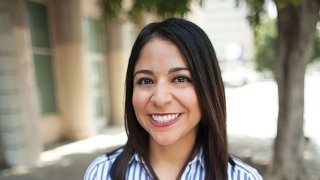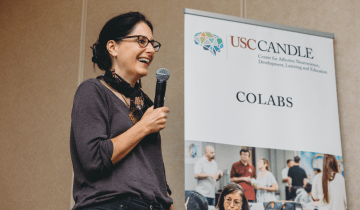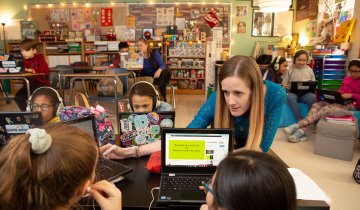Lila Mendoza says she appreciates what it took for her immigrant parents to support her dream of attending college.
“They had to sacrifice a lot to get here, and worked twice as hard to provide me with opportunities they weren’t afforded, mainly educational ones,” she says of her mother, an émigré from Honduras, and her father, who came from Mexico. “They worked late nights in a fast-food restaurant, drove me to SAT prep classes and were patient when I became frustrated with the college prep process.”
But despite their devotion, they didn’t have the knowledge or resources to help their daughter, born and raised in South Los Angeles, to achieve her higher education goals. The gap, she says, was filled by a nonprofit mentoring program in which professional women boost the self-esteem of young girls and help prepare them for college. Mendoza credits that help for her acceptance into and success at Pitzer College as an undergraduate, and later as a Fulbright scholarship recipient teaching English in South Korea.
The first college graduate in her family, Mendoza is now helping others prepare for and succeed in college through the Southern California College Advising Corps (SCCAC). Launched in 2013 by USC Rossier’s Center for Enrollment Research, Policy, and Practice (CERPP) in conjunction with the national College Advising Corps, the program places recent college graduates in high schools as college advisers. For two years, these “near peers” work directly with students, making significant strides in increasing college attendance among those who are low-income, first-generation and from underrepresented populations. She is now in her second year of serving at the Diego Rivera Learning Complex in the Los Angeles Unified School District.
She is among 31 SCCAC advisers working in 23 schools at 6 Southern California school districts during this academic year. In 2015–16, advisers assisted with 14,507 four-year-college applications, almost 2,200 two-year-college applications and more than $3 million in awarded scholarships. In addition, compared to the previous year, fall 2015 University of California and California State University enrollment increased by 2 percent among students in the LAUSD schools served by the program; Diego Rivera Learning Complex students showed the biggest gain, with a 10 percent increase.
Her advisory work has benefited from her studies at Rossier, where she is enrolled in the Educational Counseling master’s program. Particularly helpful, Mendoza says, has been learning the various approaches to counseling and finding the one that suits her the best. “Because no two students are alike, I usually take a person-centered approach that meets the student wherever she or he is,” she explains.
That’s the way she mentored Guadalupe Nufio, now a freshman at Columbia University. Guadalupe says relating to Lila was easy, in part because they both grew up in South Los Angeles and are the first in their families to attend college.
“I think that if I had a different counselor, I wouldn’t be here at an Ivy League school,” says Nufio, who initially only wanted to apply to California public colleges. “Lila encouraged me to look at private universities, where I could get better financial support, and not be afraid to go out of state and experience new cultures. She really cares about students personally, and never let me settle for what I knew I could do.”
This past summer, Mendoza had a special opportunity to assist her fellow advisers and boost her own professional growth when she was asked to chair the summer training committee for SCCAC. “I’m really grateful for the experience because it helped me realize that I possess leadership skills,” she says of her role organizing teams of people and managing multiple agendas and calendars as well as planning out a short and intensive training.
When Mendoza completes her master’s degree, she hopes to advise community college students. “Although I love the work I’m doing now, there is also a great need once students step foot onto a college campus, especially at community colleges, where retention and transfer rates are low,” she says. “I want to be part of the solution, helping them to access the resources they need to succeed.”
*Thank you to all of our donors who generously supported USC Rossier during fiscal year 2016 (July 1, 2015, to June 30, 2016).




